Dachshunds can live long, full lives. 🌟 But aging often brings changes that are hard to ignore.
One of the most concerning conditions in senior Dachshunds is dementia, also known as Canine Cognitive Dysfunction (CCD). 🐾 Dachshund dementia is a progressive decline in brain function that can lead to confusion, memory loss, and changes in behavior.
Many owners notice small shifts at first, like disorientation or disrupted sleep. 🌙 Unusual anxiety can sneak in, too. 😟
Over time, these changes may become more obvious and affect daily life. Recognizing the signs early makes it easier to manage the condition and improve comfort. 💛
Caring for a Dachshund with dementia takes patience and a sharp eye. 👀 The right support can make a world of difference.
With proper care, medication, and lifestyle tweaks, you might slow the progression and help your dog stay engaged and comfortable for longer. 🐶
Key Takeaways 📝
- Dachshund dementia is a decline in brain function that affects behavior and memory 🧠
- Early recognition of symptoms allows for better management and support 🌼
- Treatment, home care, and lifestyle changes can improve quality of life 🐕
🐾 Free Dachshund Care Guide
Download our free checklist to ensure your Dachshund stays happy, healthy, and well-loved!
Get Your Free Guide 🐶Understanding Dachshund Dementia
Dachshunds can develop age-related cognitive decline that affects memory, learning, and behavior. 🐾 Spotting the difference between normal aging and canine cognitive dysfunction helps owners provide the right care and support. 💛
What Is Dementia in Dachshunds 🐶
Dementia in Dachshunds, also called canine cognitive dysfunction (CCD), is a medical condition that changes how the brain functions as dogs age. 🧠 It’s often compared to Alzheimer’s disease in humans because it leads to confusion, disorientation, and memory loss.
Dogs with dementia may forget routines they once knew, such as house training or familiar walking routes. 🚶♂️ Some will pace, stare at walls, or look lost in their own home.
Unlike temporary confusion from illness or medication, dementia symptoms stick around and progress slowly. There isn’t a cure, but early detection and good management can improve a Dachshund’s comfort and daily life. 🌼

💰 The Swiftest – Plan Ahead for Dementia Care Costs
Dementia care can get expensive. Compare top pet insurance plans to make sure your senior Dachshund gets the support they deserve—without extra stress on your wallet.
- Quickly compare trusted insurance providers 🐾
- Find coverage for meds, vet visits, and therapies 🩺
- Peace of mind knowing your Doxie’s future is protected ❤️
Differences Between Dementia and Normal Aging 🐕
Older Dachshunds often slow down, nap more, or show mild stiffness. 😴 These changes are expected with age and don’t always signal dementia.
The difference comes with behavioral and cognitive changes. A dog with dementia may:
- Forget familiar family members 🐾
- Fail to recognize the backyard or home 🏡
- Bark at night without reason 🌙
- Lose interest in play or bonding 💔
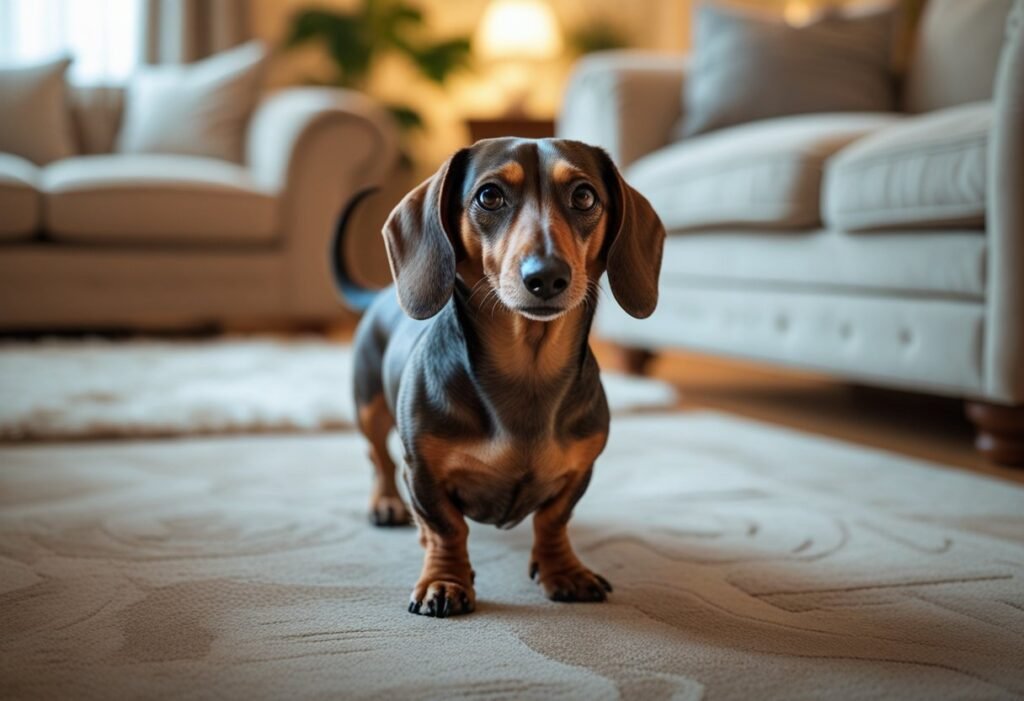
Normal aging usually doesn’t cause severe disorientation or major changes in personality. For example, an older dog may walk slower, but a dog with dementia may wander aimlessly or act anxious in familiar spaces. 😟
Keeping track of symptoms in a simple chart can help owners notice when normal aging shifts into cognitive decline. 📊
Overview of Canine Cognitive Dysfunction 📝
Canine cognitive dysfunction (CCD) is the medical term for dementia in dogs. Changes in the brain like reduced blood flow, nerve cell damage, and chemical imbalances interfere with memory, learning, and awareness.
Veterinarians often use the acronym DISHA to describe symptoms:
- Disorientation 🌫️
- Interactions (changes with people or pets) 🐕
- Sleep-wake cycle changes 🌙
- House soiling or loss of training 🏠
- Activity level changes ⚡
CCD gets worse over time. Treatments like medication, supplements, diet changes, and structured routines can help slow decline and support a Dachshund’s quality of life. 🌟
Causes and Risk Factors
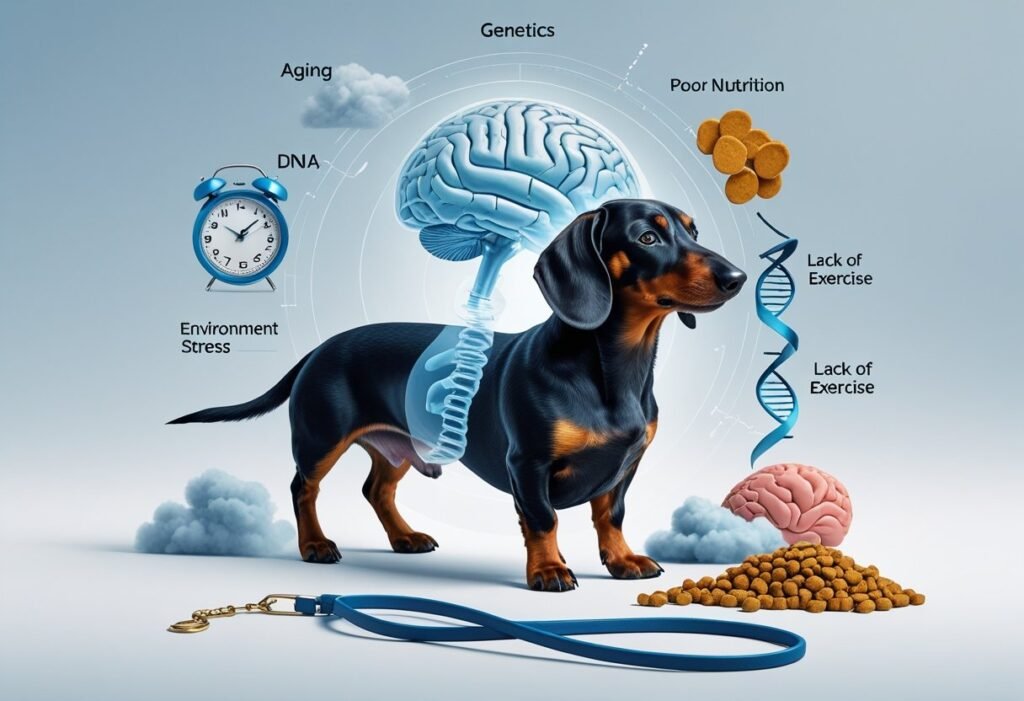
Dachshund dementia develops through a mix of inherited traits, natural aging of the brain, and outside conditions that affect long-term health. 🐾 Each factor can add to the likelihood of cognitive decline, and together they shape how the disease appears and progresses. 🌟
Genetic Predispositions 🧬
Some breeds show higher chances of developing cognitive dysfunction, and Dachshunds are among them. Their long lifespan compared to larger breeds increases exposure to age-related brain changes, but genetics also play a role.
Inherited traits may affect how brain cells process proteins, remove waste, or manage inflammation. 🔬 If these processes don’t work well, brain tissue can decline faster.
Families with a history of neurological issues in their dogs may see dementia appear more often. 🐕 While no single gene has been identified, scientists believe multiple genetic factors contribute.
This risk doesn’t guarantee dementia, but it does mean Dachshunds might be more vulnerable than some other breeds. Responsible breeding practices that focus on overall health can help limit inherited risks. 🌼

🧩 Brain Training for Dogs – Keep Your Doxie’s Mind Sharp
Simple, fun games to help slow cognitive decline and keep your Dachshund engaged, happy, and mentally stimulated every day.
- Gentle activities tailored for senior dogs 🌟
- Boosts memory and mental focus through play 🎾
- Builds a stronger bond between you and your pup ❤️
Age-Related Changes ⏳
The most consistent risk factor for dementia in dogs is age. As Dachshunds grow older, their brains undergo changes that affect memory, learning, and behavior.
Protein buildup in the brain, reduced blood flow, and loss of nerve connections can all interfere with normal function. 🧠 These changes resemble those seen in human conditions like Alzheimer’s disease.
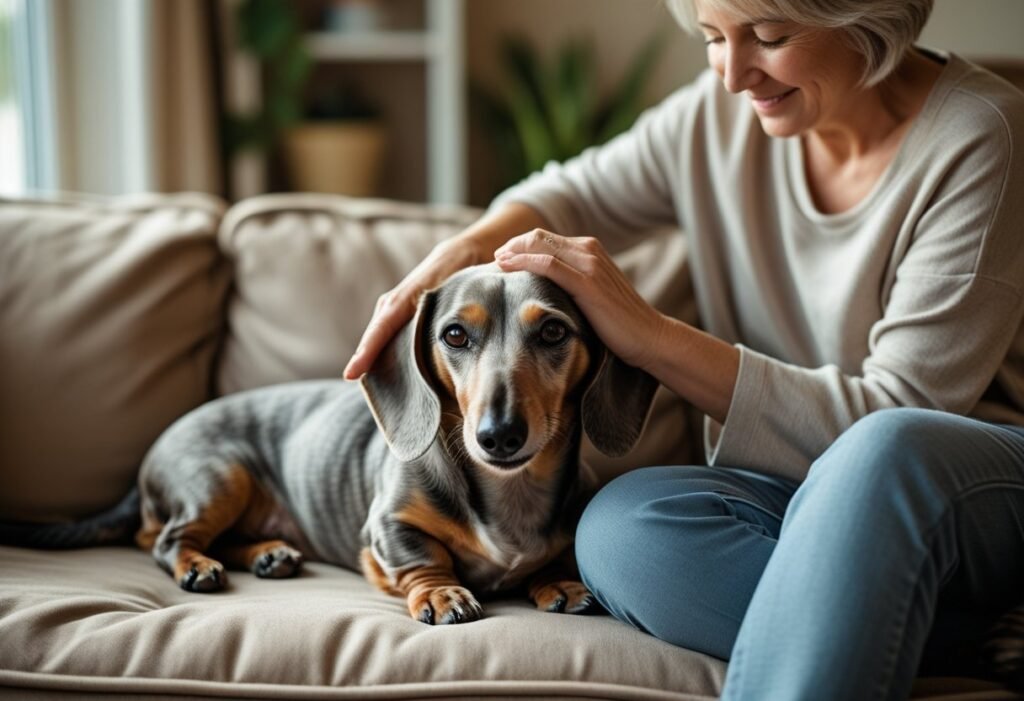
Older Dachshunds may show signs such as confusion, disrupted sleep cycles, or forgetting familiar routines. 🌙 These symptoms often appear gradually and worsen over time.
Because Dachshunds often live well into their teens, they face a longer period where age-related decline can appear. Regular checkups help detect early changes and rule out other health problems that mimic dementia. 🩺
Environmental Influences 🌍
Lifestyle and health conditions can increase the risk of dementia. Chronic illnesses such as diabetes, kidney disease, or high blood pressure may affect brain health by reducing circulation or altering metabolism.
Poor nutrition, lack of exercise, and limited mental stimulation also raise risk. Dogs that don’t engage in regular activity may experience faster decline. 🐾
Stress, social isolation, and poor quality of sleep can further affect brain function. 💤 A stable routine, healthy diet, and daily interaction may help lower these risks.
Environmental enrichment—like puzzle toys, training exercises, and safe exploration—supports brain activity. 🧩 Even small changes can make a noticeable difference in keeping dogs sharp.
Early Signs and Symptoms
Dachshunds with dementia often show changes in how they act, how they move through familiar spaces, and how they rest at night. 🐾 These shifts may seem minor at first but usually become more noticeable as the condition progresses. 🌙
Behavioral Changes 🐕
One of the first signs of dementia in Dachshunds is a change in normal behavior. A dog that was once social may begin to withdraw from family members or lose interest in play. 🎾
Some may become restless, pacing or circling without clear purpose. Owners may also notice changes in how their Dachshund interacts with routine activities.
For example, a dog may forget learned commands or seem confused when asked to perform tasks it once knew well. ❓ Accidents in the house can happen even in dogs that were reliably housetrained.
Increased anxiety is another common change. A Dachshund may bark more often, whine without reason, or become startled by everyday noises. 😟
These behaviors aren’t about stubbornness—they come from changes in the brain that affect memory and awareness. 🧠

🍲 ChefPaw Dog Food Maker
- Make fresh, nutrient-rich meals at home
- Perfect for senior dogs with sensitive tummies
- Control ingredients for brain-boosting diets

🌱 Wild Earth Complete Protein Dog Food
- Plant-based formula with clean ingredients
- Supports long-term brain and body health
- Gentle on sensitive stomachs and digestion
Disorientation and Confusion 🌫️
Disorientation is a frequent symptom of canine cognitive dysfunction. A Dachshund may wander aimlessly or appear lost in its own home.
Some dogs stand in corners or behind furniture as if unsure how to get out. Confusion can also show up during daily routines.

A dog may wait at the wrong door to go outside or fail to recognize familiar people. Sometimes, it may forget where its food or water bowls are, even if they haven’t moved. 🍽️
These signs often stand out more at night when the house is quiet. A Dachshund may pace, whimper, or seem unsettled during hours when it once rested calmly. 🌙
Such episodes can be distressing for both the dog and the owner. 💔
Altered Sleep Patterns 💤
Sleep disturbances are common in Dachshunds with dementia. Dogs may stay awake at night, pacing or vocalizing, and then sleep heavily during the day.
This shift in rhythm can disrupt the household and make it harder for the dog to maintain regular routines. Some dogs wake frequently during the night as if they can’t settle.
Others may seem agitated or restless, moving from room to room. 🚪 These changes often go hand in hand with confusion and anxiety.
Owners sometimes mistake these patterns for normal aging, but a clear change in sleep-wake cycles is an important sign of dementia. 🐾 Keeping track of when and how often a Dachshund is awake at night can help a veterinarian evaluate the condition more accurately. 🩺
Progression of Dachshund Dementia

Dachshund dementia develops slowly and often begins with mild confusion before advancing to more serious changes in behavior and memory. 🐾 The condition affects both mental function and daily routines, making it harder for dogs to recognize familiar people, places, and activities. 💛
Stages of Cognitive Decline 🧠
Canine dementia usually progresses in three main stages:
- Early stage – The dog may seem slightly disoriented, forget simple routines, or have trouble finding food and water bowls. 🍽️ Sleep patterns can shift, with more rest during the day and restlessness at night. 🌙
- Moderate stage – Confusion becomes more noticeable. The dog may pace, stare at walls, or seem lost in familiar areas. 🚶♂️ Accidents in the house increase, even if the dog was previously house-trained.
- Advanced stage – The dog may struggle to recognize family members, show little interest in interaction, and have difficulty navigating the home. 🏡 At this point, quality of life can decline significantly. 💔
Progression is gradual, but the rate varies by individual. Some dogs remain stable for months, while others decline more quickly.
Regular checkups help track changes and adjust care as needed. 🩺
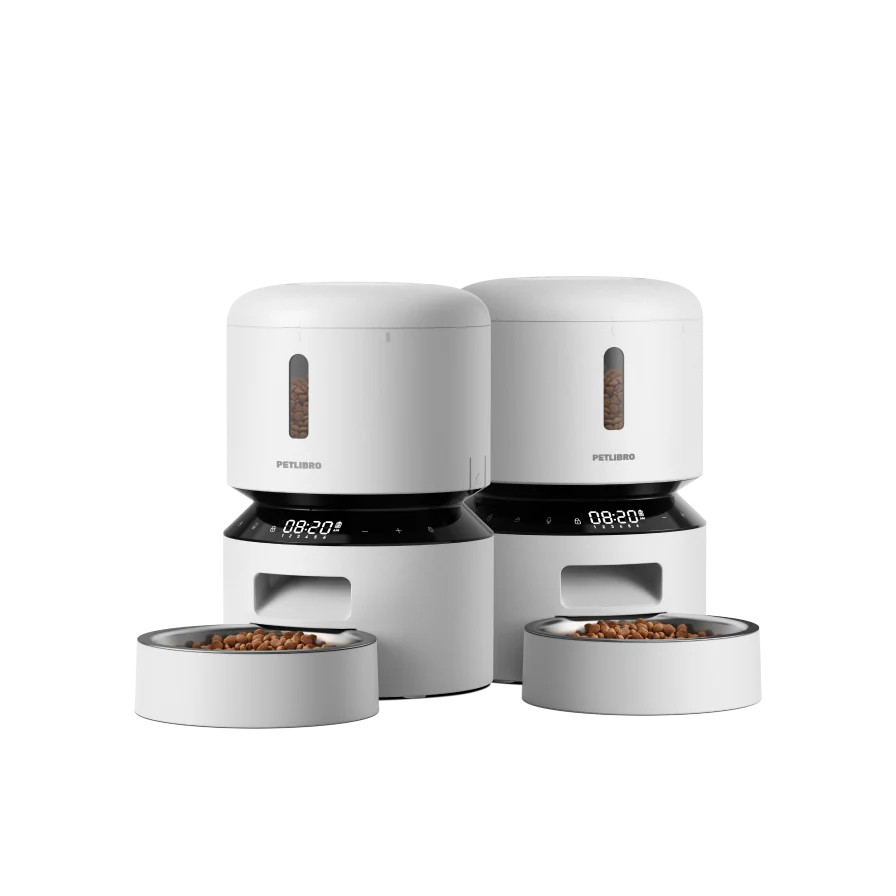
🍽️ PETLIBRO Automatic Feeder
- Delivers meals at the same time every day
- Perfect for dogs who forget routine feeding times
- Helps maintain stable blood sugar and mood
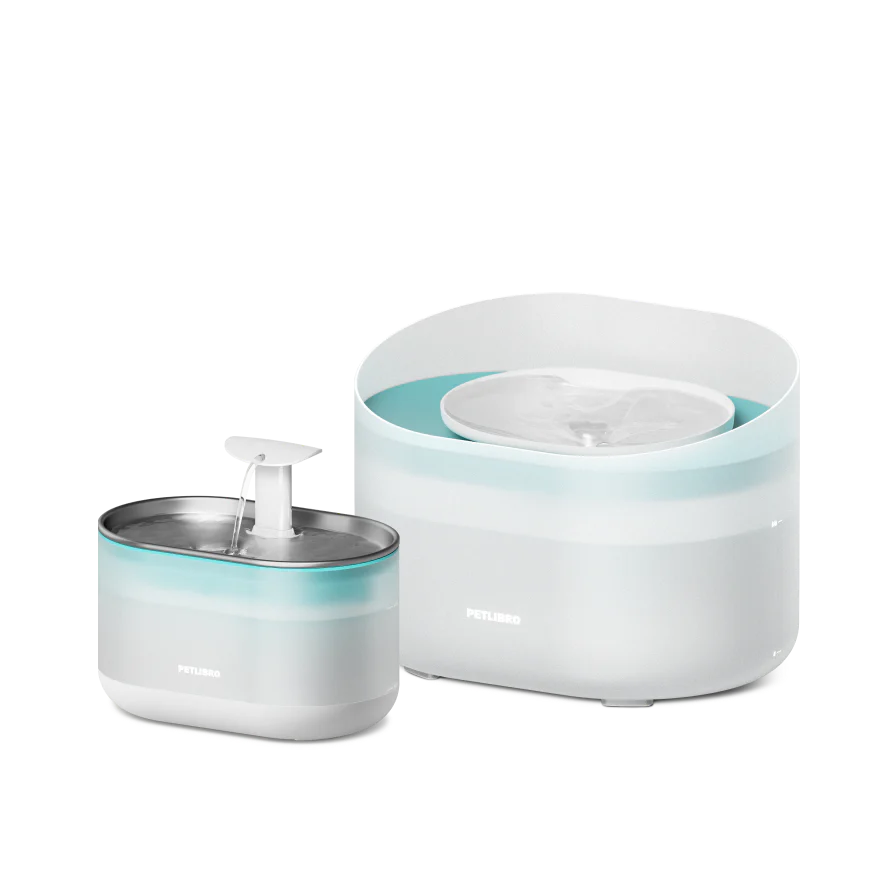
💧 PETLIBRO Water Fountain
- Fresh, flowing water encourages frequent drinking
- Reduces dehydration risks in senior dogs
- Quiet motor for peaceful home environments

Impact on Daily Life 🌟
As dementia advances, daily routines get harder for a Dachshund to follow. They might forget feeding times, become restless at night, or lose interest in play and walks. 🎾
Owners often notice repeated pacing or barking for no clear reason. Some dogs just can’t seem to settle down. 😟
House training tends to break down, which means more cleaning and patience. 🧹 Dogs may also get anxious when left alone or if you move things around at home—even just a little bit.
Simple adjustments can make daily life easier. Helpful strategies include:
- Keeping a consistent schedule 🗓️
- Using night lights for easier navigation 💡
- Providing puzzle toys for mental stimulation 🧩
- Limiting sudden changes in the home 🏠
Diagnosis and Assessment
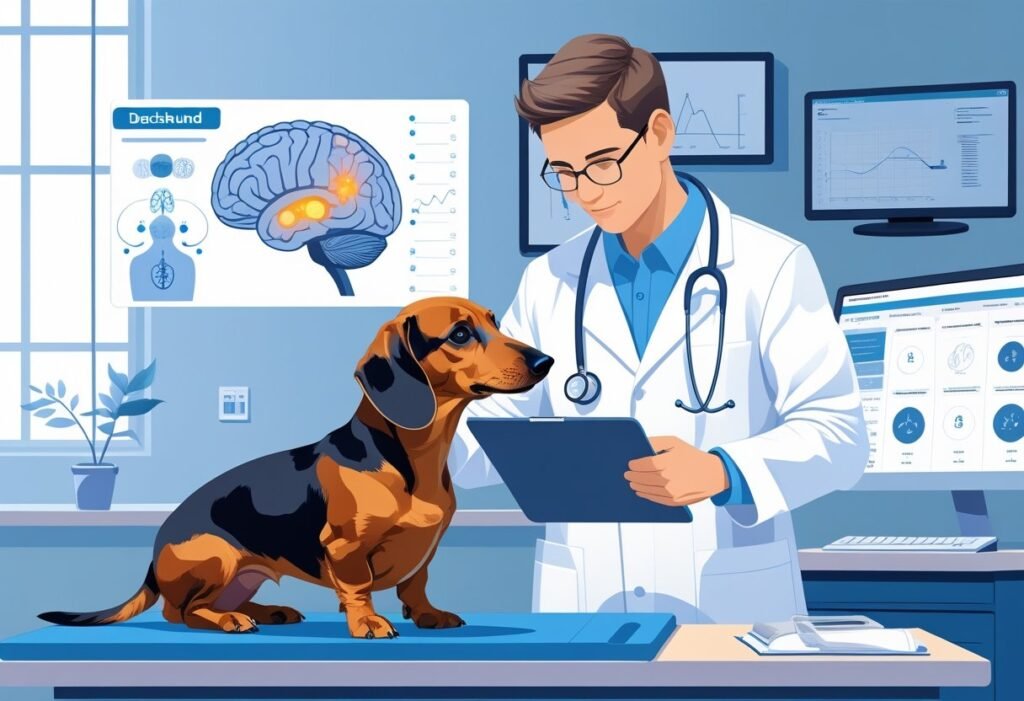
Dachshund dementia, also known as canine cognitive dysfunction (CCD), shows up through behavior changes and is confirmed with medical evaluation and assessment tools. 🐾 Since symptoms can look like other health problems, careful observation and professional testing matter a lot here. 🩺
Veterinary Evaluation 🐕🦺
A veterinarian usually starts by asking about the dog’s behavior at home. Owners might notice confusion, sleep problems, or changes in how their dog interacts with people or pets. 🐾
These early details help spot possible dementia. The vet then does a physical exam to rule out other causes. 🧪
Things like arthritis, vision loss, or hearing decline can look a lot like dementia. Bloodwork and urinalysis check for problems like thyroid disease, kidney issues, or infections. 🧬
Vets often ask owners when the changes started, how often they happen, and if they’re getting worse. This timeline helps show if the problem’s getting worse over time, which is a big clue for cognitive decline. 🗓️

📹 Petcube Cam 360
- Watch your Dachshund’s behavior day or night
- Two-way audio for real-time comfort and reassurance
- Peace of mind when you’re not at home
📍 Tractive DOG GPS Tracker
- Real-time tracking to prevent dangerous wandering
- Set up safe zones and get instant alerts
- Durable and waterproof for all adventures
Diagnostic Tools 📝
Structured tools help measure how severe dementia symptoms are. The DISHAA framework is a common method and looks at:
- Disorientation 🌫️
- Interactions with family or pets 🐶
- Sleep-wake cycle changes 🌙
- House soiling or loss of training 🏠
- Activity level changes ⚡
- Anxiety or altered behavior 😟

Some vets use standardized questionnaires for owners to fill out at home. These forms track changes over time and give a clearer picture of the dog’s mental state. 📄
Advanced imaging like MRI can show brain changes that match CCD, but honestly, most diagnoses rely on behavior history and regular medical exams. 🧠
Differential Diagnosis 🔍
Dementia symptoms overlap with many other conditions, so ruling out other problems is key. Dogs with arthritis might hesitate to move, which can look like confusion. 🐾
Vision or hearing loss can make a dog seem disoriented. Endocrine disorders like hypothyroidism sometimes cause lethargy or mood swings. 😔
Vets also consider neurological conditions like brain tumors, seizures, or strokes. These usually cause sudden or severe behavior changes, not the slow progression seen with CCD. 🧬
By ruling out other causes with exams, lab work, and imaging if needed, vets can more confidently diagnose dementia. ✅
Treatment and Management Strategies

Managing dementia in Dachshunds takes a mix of medical treatment, nutritional support, and daily care. 🐾 The goal is to slow cognitive decline, reduce stress, and make the dog’s life more comfortable. 💛
Medications and Supplements 💊
Veterinarians often prescribe medications to support brain function. Selegiline is a common choice and can help with memory and alertness in some dogs. 🧠
Other meds might target anxiety, sleep problems, or restlessness—those are frequent hurdles with dementia. Supplements can help, too. 🌿
Omega-3 fatty acids from fish oil may support brain health. Antioxidants like vitamin E and vitamin C sometimes get recommended to fight oxidative stress in the brain.
Some dogs do well with SAMe (S-adenosylmethionine), which could lift mood or sharpen thinking. ✨ Melatonin sometimes helps with sleep. Owners should always check with their vet before starting supplements since interactions happen. 🩺

🛏️ Majestic Pet Orthopedic Bed
- Extra support for aging joints and fragile bodies
- Helps your dog rest better and stay comfortable
- Durable, cozy design perfect for senior Doxies

🪮 Pride + Groom Grooming Tools Kit
- Safe, gentle tools for sensitive senior skin
- Keep your Dachshund clean and comfortable
- Essential grooming made stress-free
Dietary Adjustments 🍽️
Diet matters for cognitive health in older dogs. Special prescription diets have more antioxidants, medium-chain triglycerides (MCTs), and omega-3s. These nutrients might support memory and slow dementia.

Owners can adjust feeding routines, too. Serving meals at the same time each day creates predictability. 🗓️ Smaller, more frequent meals may work better for some seniors.
Hydration is just as important. 💧 Some senior dogs forget to drink, so keeping fresh water in several spots helps. Regularly checking weight and appetite keeps the diet on track.
Behavioral Therapies 🧩
Mental stimulation helps slow cognitive decline. Simple activities—puzzle toys, short training sessions, or gentle scent games—keep the brain busy. 🐶
These should be brief and positive, so the dog doesn’t get frustrated. Routine is huge for reducing confusion.
Consistent walks, feeding, and bedtime help the dog feel secure. 🚶♂️ Keeping the surroundings familiar and avoiding changes lowers the risk of disorientation.
Environmental tweaks matter, too. Night lights can ease nighttime anxiety, and non-slip rugs help with mobility. 🌙 Calm, gentle interaction and patience from family members create a supportive environment that makes coping a bit easier. ❤️
Home Care and Support
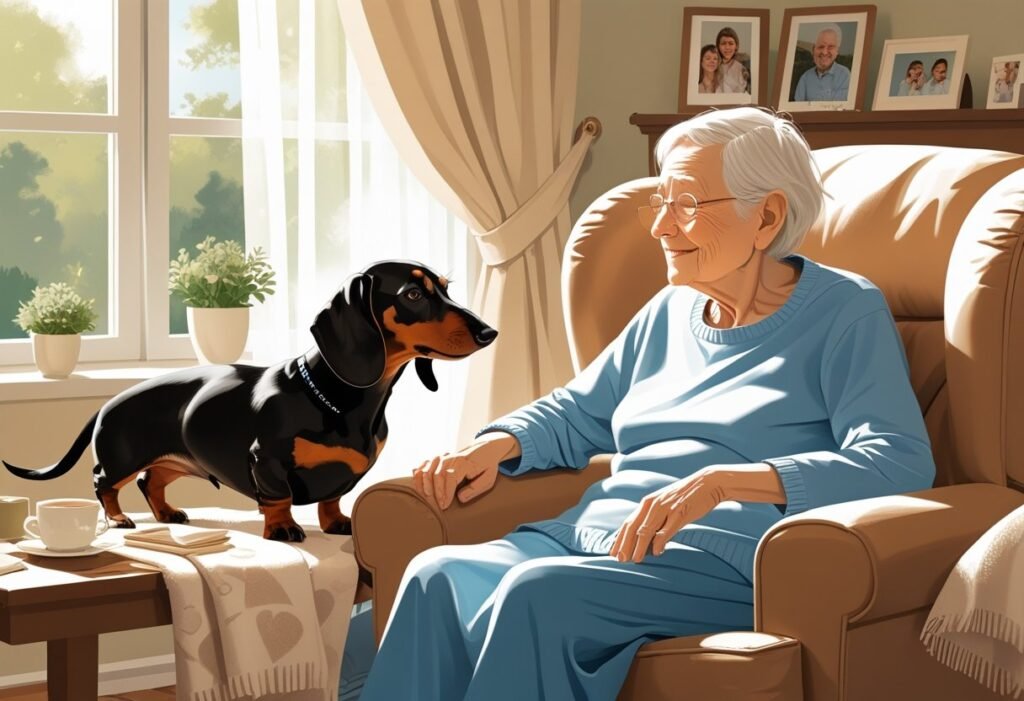
Dogs with dementia often feel confused and anxious. 😟 They really do best with a safe home setup and steady routines that lower stress and fit their changing needs. 🐾
Creating a Safe Environment 🏡
A dog with dementia might wander, get stuck, or forget familiar areas. Owners should block off stairs, remove tripping hazards, and keep pathways clear.
This cuts down on accidents and keeps the dog from getting trapped. 🚪 Always keep food, water, and bedding in the same spot—moving them just makes things harder for the dog. 🍽️
Lighting matters, too. Night lights in hallways or near the bed can help if vision is poor or the dog gets restless at night. 🌙
A calm, quiet sleeping area away from noise supports better rest. 💤
Checklist for safety:
- Block stairs and unsafe areas 🐾
- Keep floors clutter-free 🧹
- Use non-slip rugs for traction 🛋️
- Provide steady access to food, water, and bed 🥣
- Add night lights for visibility 💡

🌿 Zomalka Anxiety Relief Drops
- Helps soothe stress and restlessness naturally
- Perfect for nighttime pacing and confusion
- Safe for long-term use in senior Dachshunds

🧬 AnimalBiome Gut Health Test Kit
- Easy, at-home test to check gut health
- Understand links between digestion and behavior
- Guides targeted care for overall wellness

Daily Routines and Enrichment 🗓️
Dogs with dementia depend on predictable routines. Feeding, bathroom breaks, and walks should happen at the same time every day.
This helps cut confusion and makes the dog feel safer. Short, gentle walks keep joints moving and provide a little mental stimulation, but don’t overdo it—light activity is enough. 🚶♂️
Mental enrichment matters, too. Simple puzzle feeders, soft toys, and scent games can engage the brain without overwhelming the dog. 🧩
Pick activities that fit your dog’s energy and comfort level. Interaction matters more than people think—talking in a calm voice, gentle petting, and short play sessions build trust and reassurance. ❤️ Even a little attention can boost mood and reduce anxiety. 🌼
Living With a Dachshund With Dementia
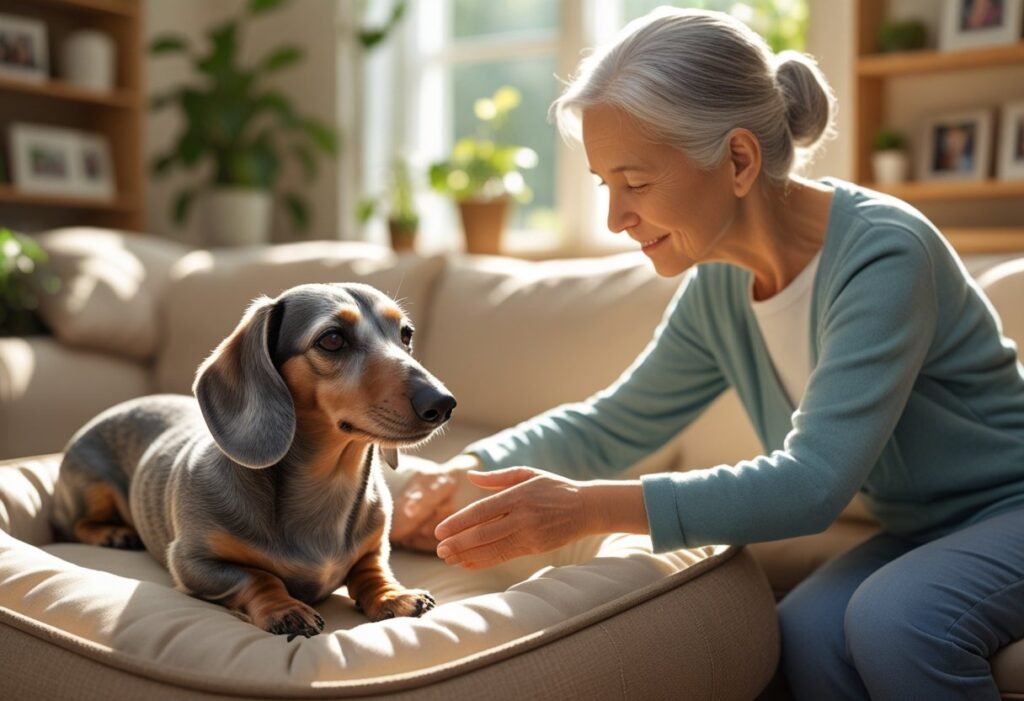
Caring for a Dachshund with dementia means balancing medical needs with routines that cut down on confusion. 🐾 Owners face emotional challenges, too—it takes patience and practical coping strategies. 💛
Supporting Quality of Life 🌟
Dogs with dementia do better with consistent routines. Feeding, walks, and bedtime should happen at the same time each day to lower anxiety. 🗓️
Keep food, water, and bedding in fixed spots so the dog can find them easily. 🍽️ A calm environment helps—don’t move furniture or add clutter, since changes can make things worse.
Soft lighting at night can help with restlessness or confusion after dark. 🌙 Gentle stimulation is useful, too.
Short play sessions, puzzle toys, or slow walks engage the dog without overwhelming them. 🧩 Regular vet visits matter to tweak medications, supplements, or diet as symptoms change. 🩺
Comfort is always a priority. Supportive bedding, easy access to water, and slip-free flooring make daily life safer. 🛏️ Small changes, like ramps instead of stairs, help dogs stay independent for longer. 🐕
🧡 Extra Comfort & Safety Essentials for Senior Dachshunds
- 📹 Petcube 2 Bites — Keep an eye on your pup and offer treats remotely to comfort them during moments of confusion or separation.
- 🛗 Majestic Pet Pet-Stairs — Easy access to beds and couches without straining joints, perfect for older Dachshunds with limited mobility.
- 🧬 AnimalBiome Gut Restore Supplement — Supports a healthy gut-brain connection to improve mood and overall well-being in senior dogs.
- 🎒 Embark Pet Adventure Harness — Secure, comfortable walks with extra control for wandering or disoriented pups.

Emotional Support for Owners ❤️
Caring for a dog with dementia can be exhausting and emotional. Owners may feel sad, frustrated, or even guilty as their dog’s behavior changes. 😢
It’s normal to feel this way. Support groups—online or in person—let people share stories and ideas, which can really help with the stress. 🌼
Setting realistic expectations is important. Dementia is progressive, and while treatments can slow things down, they can’t reverse it. Accepting this helps owners focus on comfort and quality of life rather than chasing a cure. 🌟
Self-care matters, too. Taking breaks, asking for help, and keeping up with personal routines help owners stay patient and consistent for their dog. 🧘♂️
Prevention and Long-Term Outlook
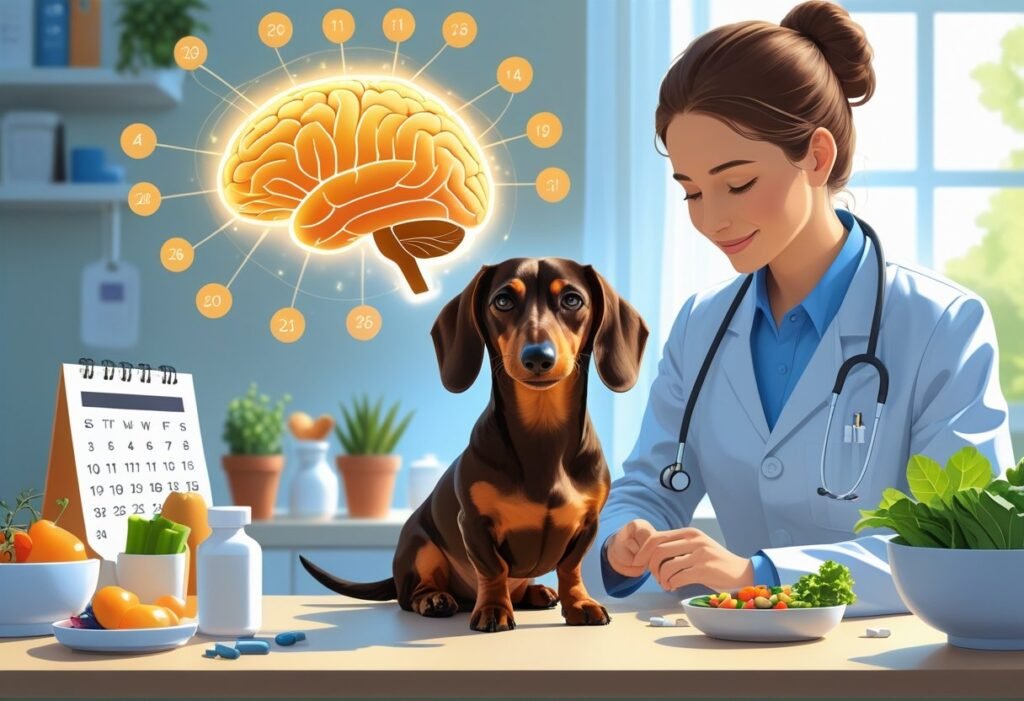
Dachshunds with dementia need early support to slow decline and stay comfortable. 🐾 Consistent routines, good medical care, and mental engagement make a real difference in quality of life and independence. 💛
Proactive Health Measures 🩺
Preventing or slowing dementia in Dachshunds often starts with regular veterinary check-ups. These visits let vets spot early cognitive changes and tweak care plans as needed.
Vets might recommend medications, supplements, or diet changes to help support brain health. 🧠 Sometimes, you’ll hear about new foods or routines that could make a difference.
Daily routines matter, too. Keeping mealtimes, walks, and bedtime consistent can ease confusion for your dog. 🗓️
Simple tweaks—like making sure walkways are clear at home—help prevent accidents. 🚪 They also cut down on stress, which is a relief for everyone. 🌼
Mental stimulation plays a big role. Short training sessions, puzzle toys, and gentle play keep a Dachshund’s mind engaged. 🧩
Physical exercise, such as daily walks, boosts circulation and supports overall health. 🚶♂️ It might even help slow down cognitive decline a bit.
Diet matters, too. Foods high in antioxidants, omega-3 fatty acids, and vitamins can support brain function. 🥗
Some dogs do better with prescription diets made for seniors with cognitive issues. It’s worth asking your vet about these options.
💛 Gentle Extras to Support Comfort & Care
- 🎯 Coastal Pet Harness – Secure, gentle walks that keep your dog safe and prevent pulling
- 🌱 Innovet PurCBD Oil – Natural calming support for anxiety and stress in senior dogs
- 🛁 King Klean Dog Shampoo – Mild, soothing wash to keep sensitive senior skin clean and healthy
- 🎨 Purr & Mutt Personalized Dachshund Art – A touching keepsake to celebrate your beloved Dachshund
- 👕 Dog is Good T-shirt – Show your love and advocacy for senior Dachshunds in style
🐾 Thoughtful touches to improve your Dachshund’s well-being—and honor every moment together.

Future Research Directions 🔬
Research on canine dementia is still picking up speed. Scientists are looking at how genetics, diet, and lifestyle shape cognitive dysfunction in Dachshunds and other breeds.
There are new medications in the works that aim to protect brain cells and help memory. Some treatments focus on reducing oxidative stress, which seems tied to aging brains. ✨
Researchers are also developing early detection tools like brain imaging and blood markers. 🧪 These could help vets spot dementia before it gets really obvious.
Another research area explores environmental enrichment. Evidence hints that dogs who stay active, both mentally and physically, may deal with dementia more slowly. 🐕
🐾 Don’t Miss Out!
Download our free Dachshund care guide to keep your furry friend happy and healthy.
Get Your Free Guide 🐶Frequently Asked Questions
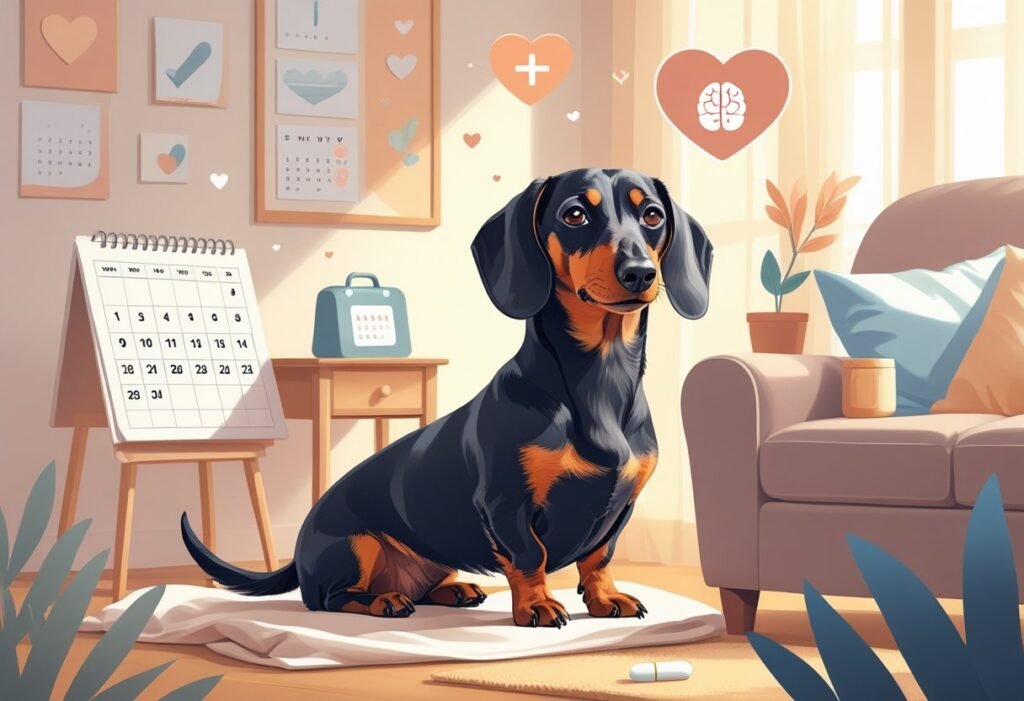
Dogs with cognitive dysfunction usually show subtle changes at first. 🐾 Over time, these changes can get more noticeable.
Care often involves managing symptoms and focusing on comfort. 💛 As the condition progresses, it’s about making thoughtful choices for your dog’s quality of life. 🌼
What are the initial symptoms of canine cognitive dysfunction? 🤔
Early signs include disorientation and changes in sleep patterns. 🌙 You might also notice less interest in play or trouble recognizing familiar people or places.
Some dogs pace, stare at walls, or seem confused even in places they know well. 🐕 It’s easy to miss at first if you’re not looking for it.
How can you comfort a dog with cognitive dysfunction during nighttime restlessness? 🌜
Sticking to a regular bedtime routine can help lower anxiety. A quiet, dimly lit space and calming aids like white noise or a night light may improve rest. 🛏️
Gentle exercise during the day sometimes helps dogs sleep more soundly at night. 🚶♂️ It’s not a guarantee, but it’s worth a try.
What treatment options are available for dogs diagnosed with cognitive dysfunction? 💊
Treatment usually means a mix of medication, supplements, and environmental enrichment. Prescription drugs might boost brain function, while diets with antioxidants and omega-3s support cognitive health. 🥗
Mental stimulation—think puzzle toys or short training sessions—can help slow down decline. 🧩 It’s not a cure, but it often makes a difference.
How do you determine the right time for euthanasia in dogs with advanced dementia? 💔
This decision really comes down to quality of life. If your dog doesn’t recognize family, can’t rest comfortably, or seems anxious and distressed, euthanasia might be the kindest option. 🌈
A veterinarian can walk you through this difficult process with compassion and medical advice. 🩺 No one wants to face it, but sometimes it’s the most loving choice. ❤️
What is the typical life expectancy after a dog is diagnosed with cognitive dysfunction? ⏳
Life expectancy varies a lot. Some dogs live for years with mild symptoms if you manage things well.
Others decline more quickly. It really depends on the dog’s health, age, and how early you catch the condition. 🐾
What are the signs that a dog is in the final stages of cognitive dysfunction? 🚨
In the later stages, dogs might seem lost in their own home. Sometimes they just stop reacting to family members altogether.
You might notice extreme confusion or that they’ve forgotten basic routines. 🏠 Some dogs lose bladder and bowel control, which can be tough for everyone involved.
Eating can become a struggle, and they may look restless or even distressed most of the time. 😔



